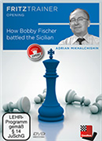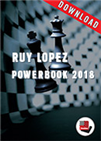A 15-year-old defending champion
Today, Fischer is a chess legend and many consider him to be the best player ever. He won all eight US Championships in which he participated, in 1963/1964 even with 11 points from 11 games. But before the US Championship 1958/1959, which took place from December 18th, 1958 to January 4th, 1959 at the Henry Hudson Hotel in New York, he was not the clear favourite, though he had just become the then youngest grandmaster of all time and was celebrated as a child prodigy. Pal Benko and Samuel Reshevsky were also given good chances to win the tournament. Benko had finished fourth in the Interzonal in Portoroz in 1958, ahead of Fischer, who ended up sixth. Reshevsky did not participate in Portoroz, but was still considered one of the best players in the US — if not the best.
However, Fischer showed from the beginning of the championship that he wanted to defend his title. He started with 3½ points from 4 games, and all these games were adjourned and lasted more than 40 moves. After a short draw with Black against Benko in round 5, Fischer faced Reshevsky in the sixth round — half-way through the tournament.
Fischer had White and benefited from his excellent opening knowledge. In a Sicilian, he followed a recommendation he had discovered in a Russian chess magazine, and scored an easy win because Reshevsky did not know the line and missed a hidden trap after which he was practically lost after only 11 moves.
 Fischer liked to play aggressive but basically sound lines against the Sicilian and many of his variations are still very much alive and a good choice for players of all levels.
Fischer liked to play aggressive but basically sound lines against the Sicilian and many of his variations are still very much alive and a good choice for players of all levels.Like Fischer, Reshevsky was a prodigy and for many years one of the best players in the world. He qualified several times for the World Championship candidates cycle, but throughout his career he had trouble with opening theory. In his autobiography My Life, Games and Compositions Benko suggests that Reshevsky's bad memory was responsible for these theoretical shortcomings.
I acted as [Reshevsky's] second in his matches versus Korchnoi and Hort. While preparing for Korchnoi, I visited his home and asked, "Where are your chess books?" To my horror I found he only owned three or four, and they were the ones that he wrote! (Years later, at the age of sixty, he picked up a few more books and proudly announced that he was finally ready to study!)
One problem Sammy had was his memory, which was terrible. During preparations for the Korchnoi and Hort matches, we would study openings all day, and by the evening he wouldn't remember anything we had looked at. Thus, he was never able to learn openings in depth, and always used up vast amounts of time in the beginning phase.
Once I realized just how bad his memory was, I was able to have some good-natured fun with him. For example, I showed him a game once and asked, "What do you think of this game?"
He said, "It's nothing special at all. These guys weren't very good."
"But Sammy, this is one of your own games!"
—Pal Benko & Jeremy Silman, My Life, Games and Compositions, Siles Press 2003, p. 117

Samuel Reshevsky at the Candidates Tournament 1968 | Photo: Ron Kroon / Anefo via Wikimedia Commons
After the win against Reshevsky in round six Fischer was the sole leader with 5 out of 6. Half a point behind followed Arthur Bisguier, while Reshevsky was stuck with 3½ out of 6 and shared 4th to 5th place. Co-favourite Benko languished at the end of the table with 1½ out of 6.

Pal Benko
Standings after Round 6
However, Reshevsky did not give up and after nine rounds he shared second to third place with Larry Evans, one point behind Fischer. But in round 10 Fischer almost stumbled. He played with White against Bisguier and gradually drifted into a bad position in a Ruy Lopez. However, at the crucial moment Bisguier missed a win and later even lost.
Bisguier simply did not find a recipe against Fischer. In the course of their careers the two played 15 tournament games against each other, and while Bisguier won the first of these games, at the 3rd Rosenwald Tournament 1956, and drew the second, played in the Open US Championship 1957, the next thirteen all ended in a victory for Fischer.
With his tenth round win against Bisguier Fischer practically won the title. With one round to go, he was one point ahead and with an easy draw against Robert Byrne in the final round the 15-year-old Fischer secured his second of a total of eight US championship titles.
Final standings
 Once again we have used exclusively games from the engine room on playchess.com for the Ruy Lopez Powerbook 2018. The tremendous number of 1.8 million games in the Ruy Lopez allows meaningful statistical analyses even amongst side variations.
Once again we have used exclusively games from the engine room on playchess.com for the Ruy Lopez Powerbook 2018. The tremendous number of 1.8 million games in the Ruy Lopez allows meaningful statistical analyses even amongst side variations.All games
Translation from German: Macauley Peterson
No other World Champion was more infamous both inside and outside the chess world than Bobby Fischer. On this DVD, a team of experts shows you the winning techniques and strategies employed by the 11th World Champion.
Grandmaster Dorian Rogozenco delves into Fischer’s openings, and retraces the development of his repertoire. What variations did Fischer play, and what sources did he use to arm himself against the best Soviet players? Mihail Marin explains Fischer’s particular style and his special strategic talent in annotated games against Spassky, Taimanov and other greats. Karsten Müller is not just a leading international endgame expert, but also a true Fischer connoisseur.
Links
























